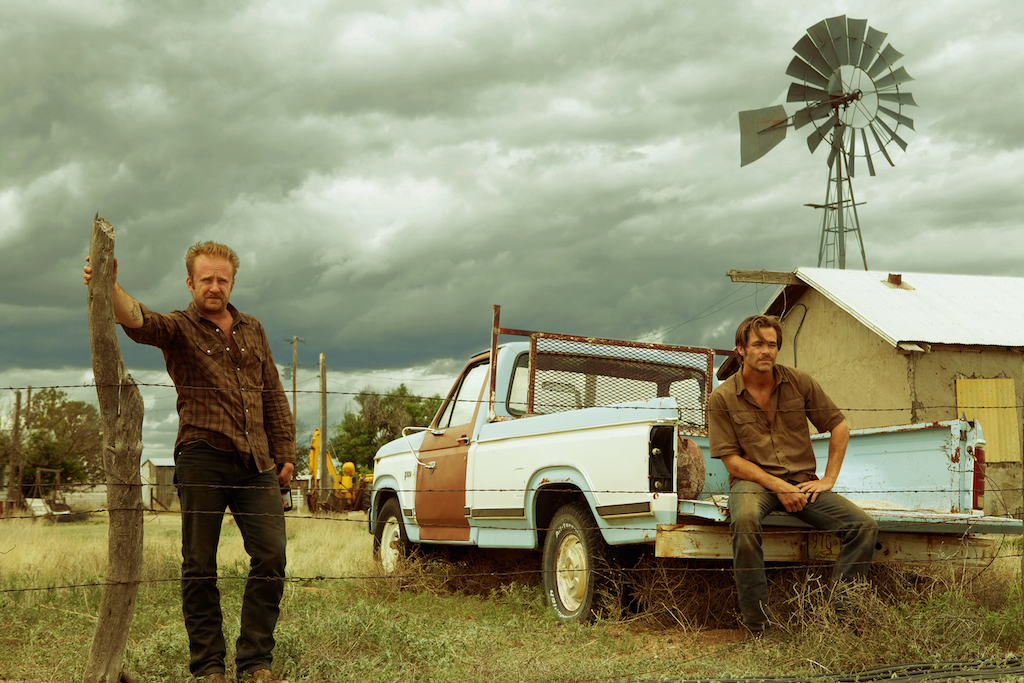
David Mackenzie’s Hell or High Water is something of a small miracle. It somehow manages to be not one, but two lively and pitch perfect buddy films; a contemporary Western; a film that captures the bruised, but not broken, spirit of a post-recession West Texas, and an exploration of fragile masculinity. It also affords Jeff Bridges one of his best performances yet—which is saying quite a lot.
Brothers Toby (Chris Pine) and Tanner (Ben Foster) are bank robbers, but not the traditional kind. Until now, Toby has been an upstanding citizen, a divorced father of two who works on his mother’s ranch. Tanner is the bad brother, in and out of prison, for a variety of crimes, both petty and not-so petty. The surprising thing about their string of robberies is that they are masterminded by Toby, not Tanner—for reasons the film only gradually reveals. The brothers have a deep reservoir of love between them, but Toby occasionally gets exasperated with Tanner, who can’t seem to stay out of trouble. (For his part, Tanner is both envious of and slightly baffled by his upstanding brother.)
Meanwhile, soon-to-be retired Texas Ranger Marcus Hamilton (Bridges) has been closely following the robberies. He’s noticed a pattern—the two outlaws come in the morning, wearing masks and wielding guns, and only take unmarked money from the drawers. He senses that the robberies are deliberately coordinated to raise a very particular sum of money. Hamilton’s partner is Alberto Parker (Gil Birmingham) and the two men bicker like an old married couple, giving each other good-natured grief. Hamilton makes fun of Parker’s half-Native-American heritage and Parker calls Hamilton washed up and old. Among other things, Hell or High Water understands the way men gruffly express their affection.
Hell or High Water also closely observes West Texas itself, which is filled with defiant but slightly bitter men and women, who work hard and see little in exchange. (The film could even give some insight into the rise of a certain orange-hued presidential candidate.) At one point, Toby gives a $200 tip to a flirty waitress at a diner; later, Hamilton wants to commandeer the money for evidence but she refuses to fork it over—she needs it to pay for child care and rent. Later, Hamilton and Parker go to a seedy steakhouse, which has only one item on the menu, where a grizzled, unintentionally hilarious old waitress barks at them, “What don’t you want?” And, let’s just say that robbing banks in open carry Texas, where most men are just itching for a chance to let their inner renegade cowboy out, is a uniquely dangerous proposition.
A few words on the performances. I’ve never really been on the Chris Pine train (I’ve always seen him as one of the lesser Chrises), but he is excellent here—handsome and still, with a touch of melancholy mixed into his steely-eyed masculinity. Foster is one of those actors who lives to play high-wire, volatile characters like Tanner, but he adds some new wrinkles here—he enjoys being bad even if he knows it’s self-destructive. Character actor Birmingham has never had a role this rich—he’s a bit like an aggrieved but doting spouse. As for Bridges, he plays a man who loves his job and is dreading his retirement, but is too wily and jaded for self-pity. He approaches everything with gallows humor and seen-it-all cynicism, including himself.
Hell or High Water is funny and exciting; tender and wise. It also looks great—it’s shot in that John Ford traditional of stoic men squinting into dusty landscapes. Mackenzie happens to be Scottish, but he’s made the best American Western in years.
